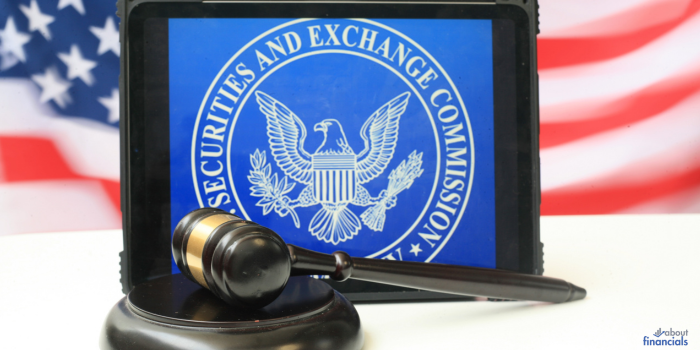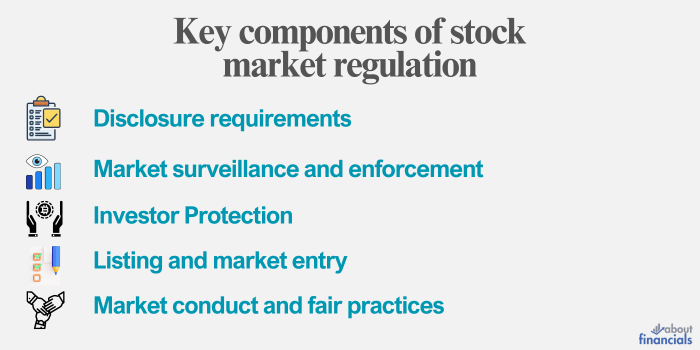Stock market regulation, intertwined with the history of the stock market, plays a pivotal role in shaping the stability and prosperity of global economies. Understanding the regulatory bodies that oversee these markets and who regulates the stock market is essential for investors and businesses alike to make informed decisions and navigate the complexities of the financial world.
Stock market regulation overview
Stock market regulation refers to the system of rules and oversight mechanisms designed to govern the conduct of participants in financial markets, particularly in the trading of stocks and securities.
Its primary objectives are to protect investors, maintain market integrity, and foster transparency.
Regulatory bodies are the key enforcers of these rules, acting as watchdogs to ensure that markets function efficiently and with credibility.
Top Stock Markets and their respective Regulatory bodies
1. United States
Securities and Exchange Commission (SEC)

The Securities and Exchange Commission (SEC) is one of the most influential regulatory bodies worldwide and the primary overseer of the securities industry in the United States.
Established in 1934 following the aftermath of the Great Depression, the SEC was created to restore investor confidence and prevent fraudulent practices that had led to the market crash of 1929.
The SEC’s main functions encompass several critical aspects of market regulation.
Firstly, it ensures investor protection by enforcing securities laws that mandate companies to provide accurate and comprehensive information to investors.
Secondly, the SEC monitors and maintains the integrity of the securities markets, detecting and preventing insider trading and other forms of market manipulation. Through its regulatory oversight, the SEC aims to create a level playing field for all market participants, fostering fair competition and investor trust.
2. United Kingdom
Financial Conduct Authority (FCA)

FCA is the primary regulatory body responsible for overseeing the financial markets in the United Kingdom. Established in 2013, the FCA operates independently of the UK government and is accountable to the Treasury and Parliament.
The FCA’s key responsibilities include ensuring market integrity, protecting consumers, and promoting competition in the financial services industry. It enforces regulations to maintain market transparency and prevent misconduct by financial institutions. Additionally, the FCA focuses on regulating conduct in retail and wholesale financial markets, aiming to uphold the highest standards of fairness and ethical behavior.
3. Japan
Financial Services Agency (FSA)

In Japan, FSA serves as the country’s financial regulator. Established in 2000, the FSA is responsible for overseeing and supervising the entire financial system, including banking, securities, and insurance sectors.
The FSA’s regulatory framework aims to ensure the stability and soundness of Japan’s financial markets. It works towards preventing financial crises by implementing measures to monitor and mitigate systemic risks. The agency collaborates with other regulatory bodies to create comprehensive policies that foster investor protection, market efficiency, and fair competition.
4. China
China Securities Regulatory Commission (CSRC)

CSRC is the main regulatory authority responsible for overseeing the securities and futures markets in China. Founded in 1992, the CSRC plays a crucial role in the development and regulation of the country’s capital markets.
As China’s financial sector has experienced rapid growth and transformation, the CSRC has continuously adapted its regulatory approach. It seeks to strike a balance between promoting market development and ensuring investor protection. The CSRC enforces regulations that address market misconduct, market manipulation, and insider trading to maintain market integrity and stability.
5. Germany
Federal Financial Supervisory Authority (BaFin)

In Germany, the Federal Financial Supervisory Authority is the key regulatory agency responsible for supervising financial institutions and markets. BaFin was established in 2002 through the merger of three previous supervisory bodies.
BaFin’s primary mission is to protect the stability and integrity of Germany’s financial system. It oversees banks, insurance companies, investment firms, and other financial intermediaries. BaFin also enforces regulations to safeguard consumer interests and ensure that financial services providers adhere to strict conduct standards. The agency plays a significant role in detecting and preventing financial crimes and money laundering.
6. Australia
Australian Securities and Investments Commission (ASIC)

ASIC is Australia’s corporate, markets, and financial services regulator. ASIC was established in 1998, and its mandate is to enforce and regulate the country’s financial laws and protect consumers in the financial sector.
ASIC’s functions include monitoring and regulating financial markets, overseeing company compliance, and enforcing laws related to corporate governance and financial services. The commission actively promotes market transparency, fair dealing, and investor education. It recently implemented reforms to improve market efficiency, reduce conflicts of interest, and enhance accountability in the financial industry.
Objective of regulatory bodies
Stock market regulation involves a versatile approach to govern the conduct of market participants, including companies, brokers, and investors. Its objectives are:
- Protecting Investors: Ensuring investors have access to accurate information and are safeguarded from fraudulent practices and market manipulations.
- Promoting Market Integrity: Preventing insider trading, market abuse, and unethical conduct to maintain market fairness and transparency.
- Fostering Market Efficiency: Facilitating smooth operations, prompt execution of trades, and efficient price discovery to promote overall market efficiency and liquidity.
Role of regulatory bodies
Regulatory bodies play a pivotal role in overseeing stock markets. These organizations are responsible for:
- Developing and implementing rules and guidelines that govern stock market activities and the behavior of market participants.
- Continuously monitoring trading activities to detect potential misconduct, market abuse, and anomalies.
- Licensing and regulating brokers, exchanges, and other market intermediaries to ensure compliance with prescribed standards.
Key components of stock market regulation

Effective stock market regulation involves various components that work in tandem to create a well-functioning and secure market environment:
Disclosure requirements
Companies listed on stock exchanges are mandated to provide regular and accurate financial reports and material information to investors and regulatory authorities.
This ensures that investors have access to relevant data to make informed investment decisions.
Market surveillance and enforcement
Regulatory bodies employ advanced surveillance systems to monitor trading activities and detect any signs of market manipulation, insider trading, or suspicious transactions.
Prompt enforcement actions are taken against violators to deter market abuses and maintain market integrity.
Investor Protection
Stock market regulations include measures to protect the interests of retail investors, such as rules against fraudulent practices and requirements for fair dealing by brokers and financial advisors.
Regulatory bodies may also establish investor education initiatives to empower investors with knowledge.
Listing and market entry
Regulatory bodies set criteria for companies to be listed on stock exchanges, ensuring that only financially sound and credible entities access public markets.
Market entry rules foster transparency and accountability among listed companies.
Market conduct and fair practices
Regulations govern the behavior of market participants, ensuring fair competition and prohibiting unfair trading practices.
Rules are in place to prevent conflicts of interest and to promote fair treatment of all investors.
Final thoughts
Stock market regulation is a vital component of global financial systems, promoting market stability, investor confidence, and economic growth.
Regulatory bodies in top countries play a critical role in overseeing financial markets, ensuring fair practices, and protecting the interests of investors and consumers. Understanding these regulatory frameworks empowers individuals and businesses to navigate the complexities of the financial world, make informed investment decisions, and contribute to a resilient and thriving global economy.

